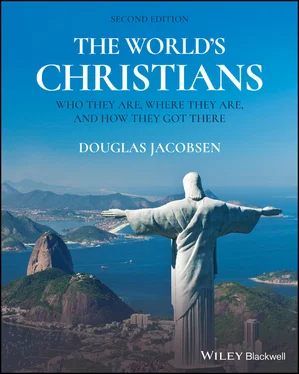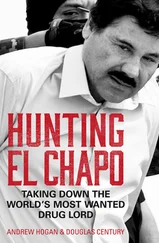© John Wiley & Sons, Inc.
Pentecostal spirituality centers on experience: feeling God’s presence within one’s own body. The testimonies of millions of Pentecostal Christians say the same thing: When the Spirit of God comes into their lives they feel overwhelmed by a strange and wonderful power. The early Pentecostal leader William Durham put it this way:
I was overcome by the mighty fulness of power and went down under it. For three hours [the Spirit of God] wrought wonderfully in me. My body was worked in sections, a section at a time. And even the skin on my face was jerked and shaken, and finally I felt my lower jaw begin to quiver in a strange way. This continued for some little time, when finally my throat began to enlarge and I felt my vocal organs being, as it were, drawn into a different shape. O how strange and wonderful it was! and how blessed it was to be thus in the hands of God. And last of all I felt my tongue begin to move and my lips to produce strange sounds which did not originate in my mind. 1
Another early Pentecostal leader said more succinctly that the Pentecostal experience was like swallowing “God liquidized.” 2
Because feelings play such a large role in Pentecostalism, some Pentecostal theologians have argued that “orthopathy” (right feeling) needs to be taken into account when trying to distinguish Pentecostalism from the other three Christian mega‐traditions, since those typically focus only on orthodoxy (right belief) and orthopraxy (right behavior). While Pentecostals emphasize emotions, they are not simply emotivists. They are also believers who recognize the importance of Christian doctrine and ethics. That said, most Pentecostal theologians would insist that the world is a much stranger and more wonderful place than words or rationality can ever fully comprehend.
Some scholars think of the Pentecostal movement as a new kind of Protestantism and are reluctant to identify Pentecostalism as a fourth Christian mega‐tradition. There are good reasons for their hesitancy. Like Protestantism, Pentecostalism stresses the individual’s relationship with God and the importance of the Bible, and like Protestantism it has no central leadership structure. It is undeniable that Pentecostalism is linked historically to Protestantism and more specifically to the pietistic strand of Protestant faith and life. In this regard, the relationship between Protestantism and Pentecostalism can be compared to the relationship that existed between Orthodoxy and Catholicism around the years 900 or 1000. While there was still a great deal of overlap between Catholicism and Orthodoxy at that point in time, their core spiritualities had drifted apart, and they were well on their way to becoming separate and distinct traditions. The same kind of spiritual differentiation is now taking place between Protestantism and Pentecostalism. Treating the two as separate traditions makes it easier to understand the overall shape and trajectory of world Christianity in the contemporary age.
Pentecostalism’s focus on the Spirit, on empirically experiencing God beyond or outside the realm of words, is very different from Protestantism’s emphasis on the Word, on theologically understanding God’s message to humankind. Rather than being a matter of the mind, Pentecostalism is about being enveloped in the love of God. It is about being healed emotionally and physically by God’s presence. It is about being “slain in the Spirit” (knocked unconscious by God’s power). It is about “letting go and letting God,” shutting off one’s thinking and relaxing into the flow of God’s Spirit within and around one’s body. Self‐control is a Protestant virtue, but it is precisely the willingness to sometimes lose control that allows Pentecostal Christians to experience God in the ways they do.
William Durham’s description of losing control under the power of the Spirit concludes with his lips producing “strange sounds which did not originate in my mind.” This is a reference to speaking in tongues, and tongues have been part of the Pentecostal movement from the beginning. Pentecostals consider speaking in tongues to be a “gift” of the Holy Spirit that can help them communicate with God. Many Pentecostal Christians also consider speaking in tongues to be the external sign that an individual has received the baptism with the Holy Spirit , an experience that involves both the complete filling of the Holy Spirit and the reception of new spiritual power (see Voices of World Christianity 4.1).
Today, speaking in tongues is optional in many Pentecostal circles. A singular emphasis on the gift of tongues has given way to a wider appreciation of all the gifts of the Holy Spirit, including both the miraculous (such as claims to heal the sick, predict the future, or even raise the dead) and the relatively ordinary (such as the ability to teach or lead or encourage others). A similar moderation of opinion has taken place about the baptism with the Holy Spirit. While many Pentecostals still consider this experience to be unique and necessary – it is the thing that makes one a Pentecostal Christian – many members of the broader Pentecostal movement now assume that a person can arrive at the Spirit‐filled life via a number of different pathways, not all of them linked to a specific experience identified as the baptism with the Spirit.
Pentecostal Christians live with the miraculous, and they assume that God’s wonder‐working power should be part of the ordinary Christian life. Individuals in all the Christian traditions (and most of the world’s religions) believe that miracles sometimes take place, but Pentecostal Christians assume that miracles occur all the time. They believe that God is constantly watching over humankind and that God is ready and willing to intervene even in the smallest details of life. So Pentecostal believers pray and expect God to respond, whether they are requesting a good parking spot, praying for a child to be healed from terminal cancer, asking for a hurricane to be directed away from a city, or seeking reconciliation when a friendship has been broken. Nothing is too small or too big to bring to God in prayer.
Pentecostals know that God does not answer all prayers in the way they want those prayers to be answered. Pentecostal believers lose their jobs, their marriages fall apart, tornados hit their homes, the banks in which they put their money fail, they get sick, and they die. But often God does seem to intervene, and when that happens, Pentecostal Christians tell each other about it. They testify about what God has done for them, and once one person begins to testify others almost always begin to tell their stories too. People love stories – it is part of being human – and people remember and retell the stories they have heard, especially if those stories are sources of encouragement and hope. So, amid life’s sorrows, Pentecostals share their miracle stories and remind each other that God loves them regardless of circumstances and that somehow, even in the worst of times, God can miraculously turn sadness and evil into good. When bad things happen, the Pentecostal reaction is not to doubt God’s power, but to cling to God’s love instead, waiting to see how God will eventually bring blessing out of adversity.
Voices of World Christianity 4.1 William J. Seymour on the Baptism with the Holy Spirit
 William J. Seymour(1870–1922) was the leader of the Azusa Street Revival in Los Angeles, one of the key events that gave rise to the Pentecostal movement. Born in Louisiana to Catholic parents, he slowly made his way through the “holiness” or “sanctified” wing of the black Baptist church to Pentecostalism. Called to be the pastor of a small Holiness Church in Los Angeles, Seymour began preaching Pentecostalism, and the congregation’s leaders locked him out of the church. Seymour persisted, however, holding services at a friend’s home and later in a rented warehouse on Azusa Street. Soon people were flocking to Los Angeles from all over the world, seeking the Holy Spirit’s baptism. In the following passage taken from the Azusa Street Mission’s newspaper The Apostolic Faith , Seymour explains how the baptism with the Holy Spirit fits into the overall progression of the Christian life. The first two experiences that he mentions (conversion and sanctification) would be typical for many Christians and not just Pentecostals. It is the third experience, the baptism with the Spirit, that differentiates Pentecostalism.
William J. Seymour(1870–1922) was the leader of the Azusa Street Revival in Los Angeles, one of the key events that gave rise to the Pentecostal movement. Born in Louisiana to Catholic parents, he slowly made his way through the “holiness” or “sanctified” wing of the black Baptist church to Pentecostalism. Called to be the pastor of a small Holiness Church in Los Angeles, Seymour began preaching Pentecostalism, and the congregation’s leaders locked him out of the church. Seymour persisted, however, holding services at a friend’s home and later in a rented warehouse on Azusa Street. Soon people were flocking to Los Angeles from all over the world, seeking the Holy Spirit’s baptism. In the following passage taken from the Azusa Street Mission’s newspaper The Apostolic Faith , Seymour explains how the baptism with the Holy Spirit fits into the overall progression of the Christian life. The first two experiences that he mentions (conversion and sanctification) would be typical for many Christians and not just Pentecostals. It is the third experience, the baptism with the Spirit, that differentiates Pentecostalism.
Читать дальше

 William J. Seymour(1870–1922) was the leader of the Azusa Street Revival in Los Angeles, one of the key events that gave rise to the Pentecostal movement. Born in Louisiana to Catholic parents, he slowly made his way through the “holiness” or “sanctified” wing of the black Baptist church to Pentecostalism. Called to be the pastor of a small Holiness Church in Los Angeles, Seymour began preaching Pentecostalism, and the congregation’s leaders locked him out of the church. Seymour persisted, however, holding services at a friend’s home and later in a rented warehouse on Azusa Street. Soon people were flocking to Los Angeles from all over the world, seeking the Holy Spirit’s baptism. In the following passage taken from the Azusa Street Mission’s newspaper The Apostolic Faith , Seymour explains how the baptism with the Holy Spirit fits into the overall progression of the Christian life. The first two experiences that he mentions (conversion and sanctification) would be typical for many Christians and not just Pentecostals. It is the third experience, the baptism with the Spirit, that differentiates Pentecostalism.
William J. Seymour(1870–1922) was the leader of the Azusa Street Revival in Los Angeles, one of the key events that gave rise to the Pentecostal movement. Born in Louisiana to Catholic parents, he slowly made his way through the “holiness” or “sanctified” wing of the black Baptist church to Pentecostalism. Called to be the pastor of a small Holiness Church in Los Angeles, Seymour began preaching Pentecostalism, and the congregation’s leaders locked him out of the church. Seymour persisted, however, holding services at a friend’s home and later in a rented warehouse on Azusa Street. Soon people were flocking to Los Angeles from all over the world, seeking the Holy Spirit’s baptism. In the following passage taken from the Azusa Street Mission’s newspaper The Apostolic Faith , Seymour explains how the baptism with the Holy Spirit fits into the overall progression of the Christian life. The first two experiences that he mentions (conversion and sanctification) would be typical for many Christians and not just Pentecostals. It is the third experience, the baptism with the Spirit, that differentiates Pentecostalism.










